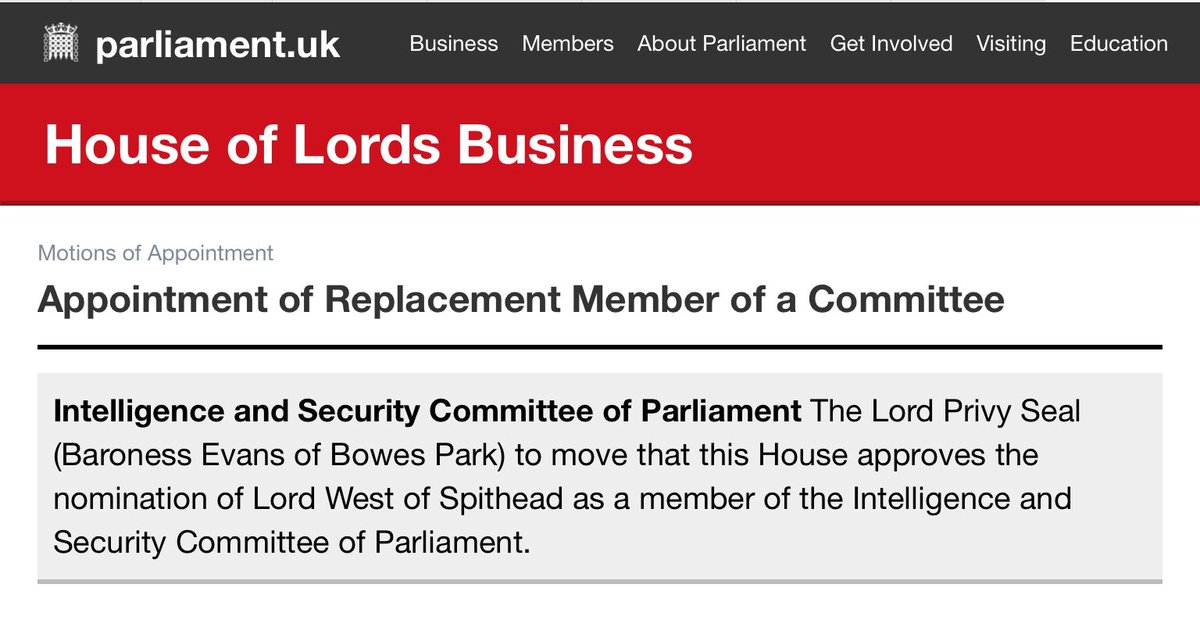Thread - some early reflections on the PM’s nominations for membership of the Intelligence & Security Committee. The ISC has 9 members, the committee is appointed by Parliament but members must first be nominated by the PM after consultation with the Leader of the Opposition 1/
On Monday MPs will vote on a motion proposing 8 ISC members from the House of Commons, on Tuesday the Lords will vote on the single Peer nominated to sit on the committee. 2/
Altho a joint committee the ISC has always been dominated by the Commons. From 1994 to 2010 only one Peer served on the ISC at any time. Since 2010 there have been two members from the Lords. Current proposals represent a step back but do potentially give the PM more leverage. 3/
The ISC chooses its own Chair from its membership - with Conservative MPs making up 5 of the 9 members of the committee the PM can be pretty much guaranteed his preferred candidate to Chair the ISC - it is widely assumed this will be Chris Grayling. 4/
The most interesting nomination is Julian Lewis who served on the ISC 2010 - 2015. Others have served on the ISC for more than one term but no-one else has left and returned. Lewis is more experienced than Grayling & would be a much less controversial choice to Chair the ISC. 5/
This is also quite an inexperienced committee with only two members returning from the previous Parliament Kevan Jones and Stewart Hosie (who only joined the ISC in 2019). Lewis would bring some valuable institutional memory. 6/
The SNP have retained their seat on the ISC which they have held since 2015 but there is no seat for the Lib Dems. The Lib Dems have been doing most of the parliamentary pushing for establishing the ISC in recent weeks. With questions & this EDM https://edm.parliament.uk/early-day-motion/57195/intelligence-and-security-committee-report-on-alleged-russian-interference-in-uk-democracy 7/
There are 2 women on the list - Diana Johnson and Theresa Villiers - one more than the previous Parliament but membership of the ISC is highly gendered. There have been no more than 2 women on the ISC at any one time, although women have had a significant impact on its agenda 8/
Women are significantly under-represented on legislative intelligence oversight committees in many states. I wrote about this in a post for #IWD200 which is here …https://watchingthewatchers.blogs.lincoln.ac.uk/2020/03/09/international-womens-day-2020-a-survey-of-womens-presence-on-intelligence-oversight-committees/ 9/
There’s been a tendency towards seniority in ISC appointments with lots of former ministers on the committee & all but one of the 7 Chairs having previously been in the Cabinet. That remains the case but Hosie, Lewis, Pritchard and Johnson have not held Ministerial office 10/
In addition to Lewis, Jones and Hosie who previously served on the ISC several other nominees may have some experience in this area - Grayling was SofS for Justice, Villiers N.Ire Secretary, John Hayes was Security Minister. Pritchard was previously a member of JCNSS 11/
The nominee with the most direct experience of intelligence is Lord West who is a former Chief of Defence Intelligence. This kind of experience perhaps makes him eminently qualified for the ISC but questions may be asked about how independent he is likely to be 12/
It’s still not clear why it’s taken so long to come up with a list of nominees. It is to be hoped that some explanation emerges in due course. Parliament could still vote against the PM’s nominees but that seems unlikely and would also further delay the appointment of the ISC 13/
The incoming ISC has a lot on its plate not least the publication of the Russia report. I’ve written more about that here in a post for the @HansardSociety https://www.hansardsociety.org.uk/blog/where-is-the-intelligence-and-security-committee-and-why-does-its-absence /end

 Read on Twitter
Read on Twitter



